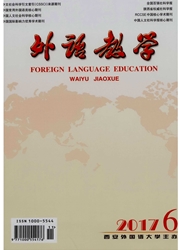

 中文摘要:
中文摘要:
1951年创刊的《中国文学》是国内唯一一份向英语世界译介中国文学的综合性刊物,引起海内外学者的深入研究,但很少有学者关注《中国文学》中高频虚化动词的英译特点。本研究基于《中国文学》(1951-1966)小说散文汉英平行语料库,以颇具特色的虚化动词“搞”为切入点,从翻译方法层面,分析了其英译特点及成因。本文认为,《中国文学》中“搞”的英译灵活运用了动词对译和变通补偿相结合的方法,呈现出直译为主、意译为辅的翻译特征,形成了忠实于原文而又可读性强的译文。本文结合《中国文学》(1951-1966)所处的时代背景,从翻译政策和译者受众意识等角度进行了原因剖析。
 英文摘要:
英文摘要:
Chinese Literature launched in 1951 has attracted much attention since it is the only comprehensive journal in China aiming at translating Chinese literature to the English world. However, the translation characteristics of the high-frequency delexical verbs in Chinese Literature have been rarely investigated till now. This paper conducts a corpus-based research on the translation characteristics and the corresponding contributing factors of the delexical verb "Gao" in Chinese Literature (1951 1966) by taking into account the translation methodology. The study shows that the translation of "Gao" uses the verb corresponding translation flexibly combined with the versatility and compensation. It also shows that the translation follows the basic methods with literal translation playing the dominant role and free translation the supplementary role, leading to the faithful to the original text and readable translation. In addition, the purpose of translation were taken into consideration from the aspects of historical background, translation policy, and translators' audience awareness of Chinese Literature(1951-1966).
 同期刊论文项目
同期刊论文项目
 同项目期刊论文
同项目期刊论文
 期刊信息
期刊信息
